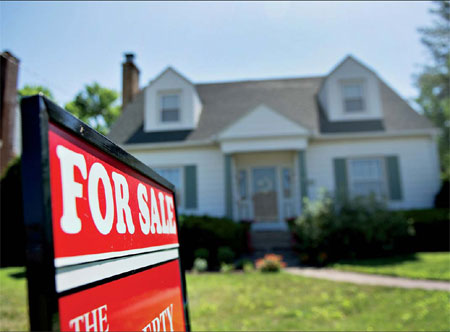Hedge your housing bets, analysts say
Updated: 2012-12-28 14:26
By Lu Chang and Zhao yanrong (China Daily)
|
|||||||||||
|
A for-sale sign outside of a home in Princeton, Illinois, US. Experts warn Chinese investors to be cautious before buying in unfamiliar markets. Provided to China Daily |
Think before you splash out on a foreign home is the advice
For the nouveau riche in China with a portfolio of real estate assets, there is a certain appeal about buying overseas property. There are no limitations from banks on home loans, the returns are stable, ownership is permanent and some countries even throw in a package deal for a citizenship with purchase.
But a big investment return always comes with high risk. Experts warned recently that investors should be cautious before buying in unknown markets.
"It is more difficult than it seems to be for an international landlord. Opening your wallet to the world creates a whole new set of unknowns," says Lu Jinyong, a professor at the University of International Business and Economics in Beijing. "You have to deal with a totally different tax system, ever-changing exchange rates and challenges of managing a home from the other side of the world."
Indeed, there are many stories from affluent Chinese who purchased properties in the United States or Europe but are then confronted with massive tax bills and high maintenance fees.
Wang Min, owner of a textile company in Guangdong province in South China, bought an 80-square-meter apartment in Houston, Texas, for $100,000 two years ago. He thought he could just sit on it and count the dollars as it appreciated in price. But he quickly discovered there was a lot more to do after the down payment.
"It's harder than you think to invest in the US real estate market," he says. "Apart from the payment of the house, there are so many invisible costs like monthly management fees, garbage fees and property tax every year, so basically you earn very little because you have to use the rent to cover those expenditures."
Though the rate of property tax can vary from state to state in the US, on average property taxes accounts for 1-2 percent of the property value, says Song Wujia, investment manager for Premier Capital Group, a real estate agency that deals with properties in the US, Europe and Australia.
The property management fee is not cheap either. At Song's agency, the expense can be about 6-10 percent of annual rent for managing a residential rental property.
"If you purchased a house for $200,000 (151,260 euros) in Atlanta, you have to pay about $4,000 to the management, and that cost will be higher if the house is in San Francisco, leaving net rent profit of 5 percent annually," he says.
In recent years, many overseas real estate agencies have come to China with alluring projects, courting Chinese. There is a strong desire among Chinese high-net-worth individuals to allocate their wealth to overseas assets, but insiders say many Chinese investors are now taking a wait-and-see approach.
Sarah Wu, 36, who works in the wine industry, says she has been long interested in a residential compound in a small village in the south of France but doesn't want to get a jump on the market too quickly because many of her friends have failed on their investments in overseas properties.
"The compound contains about 19 buildings, a swimming pool, stable, tennis court, and costs only 275,000 pounds ($443,000; 338,000 euros)," Wu says. "Compared to Beijing, with the same amount of money you can only afford a 100-sq-m apartment outside the city."
Wu eventually turned the deal down. She says though the price is right, the problem is that few people live there, and with high property taxes and management fees, it is hard either to sell or rent it.
Contact the writers at lvchang@chinadaily.com.cn and zhaoyanrong@chinadaily.com.cn
(China Daily 12/28/2012 page13)
Today's Top News
Rescuers race against time for quake victims
Telecom workers restore links
Coal mine blast kills 18 in Jilin
Intl scholarship puts China on the map
More bird flu patients discharged
Gold loses sheen, but still a safe bet
US 'turns blind eye to human rights'
Telecom workers restore links
Hot Topics
Lunar probe , China growth forecasts, Emission rules get tougher, China seen through 'colored lens', International board,
Editor's Picks

|

|

|

|

|

|






